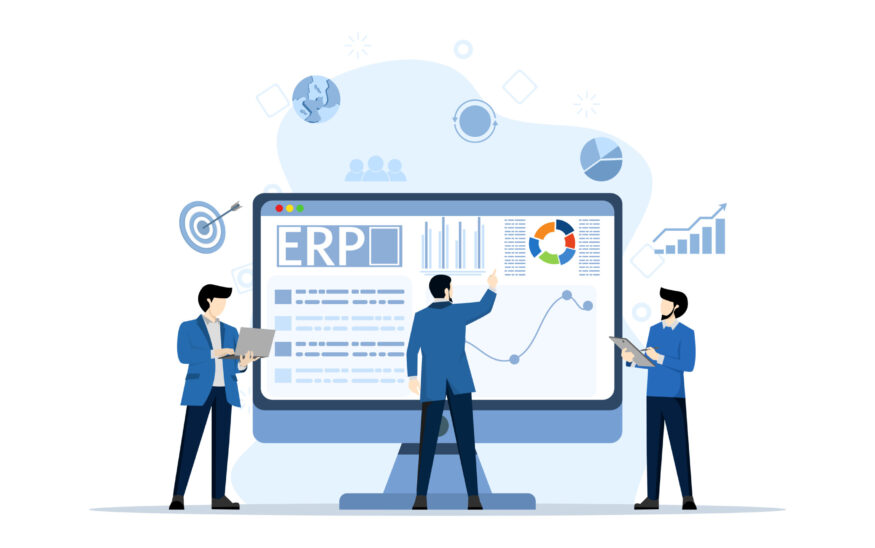ERP Testing Best Practices: A Blueprint for Success
A closer look at the best ERP testing strategies and why they matter.
Pavel Novik //October 23, 2023//


ERP Testing Best Practices: A Blueprint for Success
A closer look at the best ERP testing strategies and why they matter.
Pavel Novik //October 23, 2023//
More and more companies across industries are adopting Enterprise resource planning (ERP). According to Statista, the ERP software market is expected to reach $49 billion by the end of 2023. But since ERP adoption is such a lengthy and complicated project, many companies can neglect to ensure their ERP solution’s accurate functioning via careful ERP testing during software implementation and after launch. In the long run, such an oversight can cause both minor inconveniences for end–users and serious problems rooted in poor performance and insufficient data security.
In this article, discover the best practices to include in your ERP testing strategy.
The importance of testing your ERP solution
ERP systems serve as the backbone of an organization, streamlining and integrating various business processes: finance, human resources and supply chain management. Even a single error in ERP can have far-reaching consequences, such as software failures, costly downtime or data loss.
To improve operational efficiency and foster user confidence when using ERP for daily tasks, businesses should focus on ERP testing.
ERP testing best practices
Verify software requirements
ERP quality assurance process should start as early as creating software requirements since well-defined specifications are the foundation of both successful ERP development and future testing. Therefore, it’s vital to document functional and non-functional requirements, investigate the system and analyze it. Based on that, the organization can create the most suitable test plan and a QA strategy.
Expand test scenarios and prioritize integration testing
Catering to the needs of company departments, ERP software includes various integrations and user roles with rights to access modules and perform a large number of operations.
So, when planning your functional ERP testing activities and developing test suites, remember to collaborate with stakeholders to factor in all user journeys and create relevant test scenarios to validate as many features as possible.
ERP software is usually developed in a module way to be customizable and easily adopted by different companies. This software is typically connected to other systems, like CRM, BI solutions, banking software or eCommerce platforms, to exchange data with them. Firstly, you need to gather, analyze and test the data. Then, you can conduct integration testing and create end-to-end test scenarios covering all ERP integrations.
What is more, if your ERP system is connected to a data warehouse, consider testing the ETL (Extract-Transform-Load) processes as a part of integration testing. ETL testing will ensure that data is accurately transferred and transformed and help detect data consistency.
Implement test automation
Test automation isn’t feasible for every project, but makes sense for most ERP software implementation projects in the long-run. This is because ERP systems typically have many integrations and handle a lot of data, making ERP testing projects rather lengthy and requiring regression testing.
By automating testing activities, you can easily handle large numbers of regression test suites and free up manual testers’ time for tasks that require human involvement, such as ad hoc, new features and usability testing. It’s also necessary to create a test plan.
As ERP often relies on API to integrate with modules and external applications, companies should run automated API tests. This will allow them to identify and fix defects promptly while enabling seamless interaction between different components of the ERP system.
Along with that, it’s possible to automate sanity checks to ensure data integrity as well as validate that ERP software’s fundamental functionality works as intended.
To top it off, due to the great length of ERP projects, the investment in automation tools optimizes ROI.
Test the performance and scalability
Since an ERP system fulfills a number of critical business processes, that can be done by a lot of simultaneous users ensuring its stable performance under regular and increased loads is crucial. Conducting performance testing under both the expected load and the extreme one validates the software’s proper functioning, response time and resource usage in exceptional conditions.
Modern performance testing and monitoring tools, like Apache JMeter or Zabbix, allow QA engineers to simulate realistic and extreme user loads and detect the ERP system’s performance and scalability bottlenecks. With them, organizations detect and analyze the root causes of poor ERP performance and take appropriate measures to fix them faster.
Ensure data security
ERP systems store gigabytes of confidential information, so to protect it both at rest and in transit from breaches, it’s vital to perform comprehensive security testing.
READ: Secure Your Business in the Digital Age — Essential Data Protection Strategies
First, check the implemented access security measures that usually include role-based access controls and multi-factor authentication to ensure the ERP users can only gain the functionality and data available to their business roles.
Next, consider conducting vulnerability assessments and penetration testing during software development and throughout system operation. Vulnerability assessment will allow you to assess your ERP solution for security loopholes while penetration testing will help simulate the real cyberattack to reveal weaknesses. This approach aids in detecting and eliminating security bottlenecks before the actual data breach occurs.
Keep the documentation in order
Clear and complete test documentation helps track testing activities’ progress and simplifies the collaboration between development and QA teams, so I recommend maintaining detailed documentation of test plans, cases, data, results and all bugs identified during software testing. Thorough documentation is especially critical when testing ERP solutions for compliance with industry regulations, like Sarbanes-Oxley (SOX), GDPR, or HIPAA.
The bottom line
ERP testing is not merely ensuring your solution meets the requirements; it is about guaranteeing your operation efficiency and unlocking the full potential of your ERP investments.
To ensure high ERP solution quality,you should follow these QA best practices: verify software requirements, elaborate test scenarios, prioritize integration testing, implement test automation, test the performance and scalability, ensure data security and keep the documentation in order.
To ensure your ERP’s maximum operability, reliability and security, your strategy should go beyond standard testing activities and rely on a well-structured approach, domain knowledge and a dedicated QA team.
Pavel Novik is the Head of software testing department at a1qa.

























